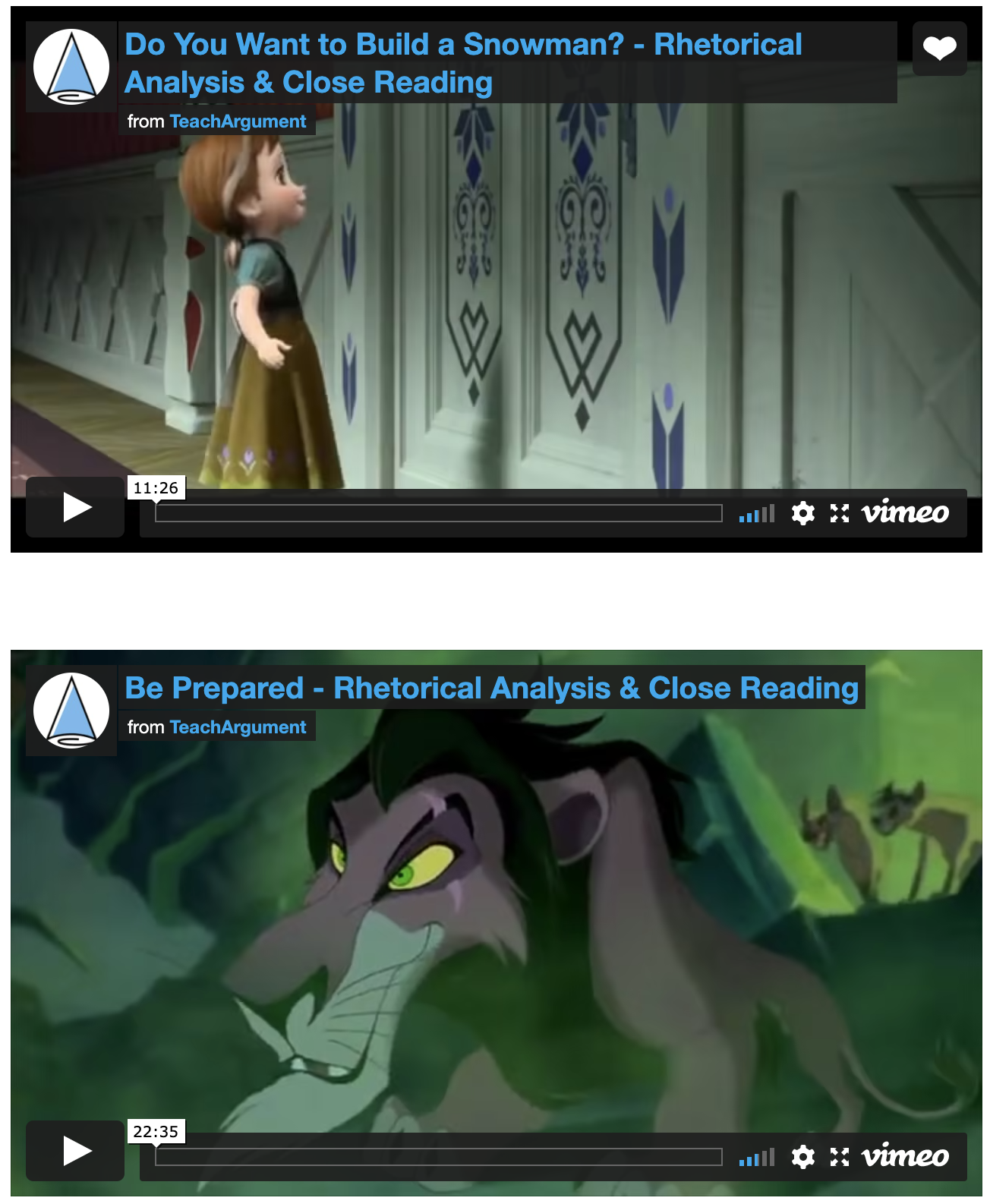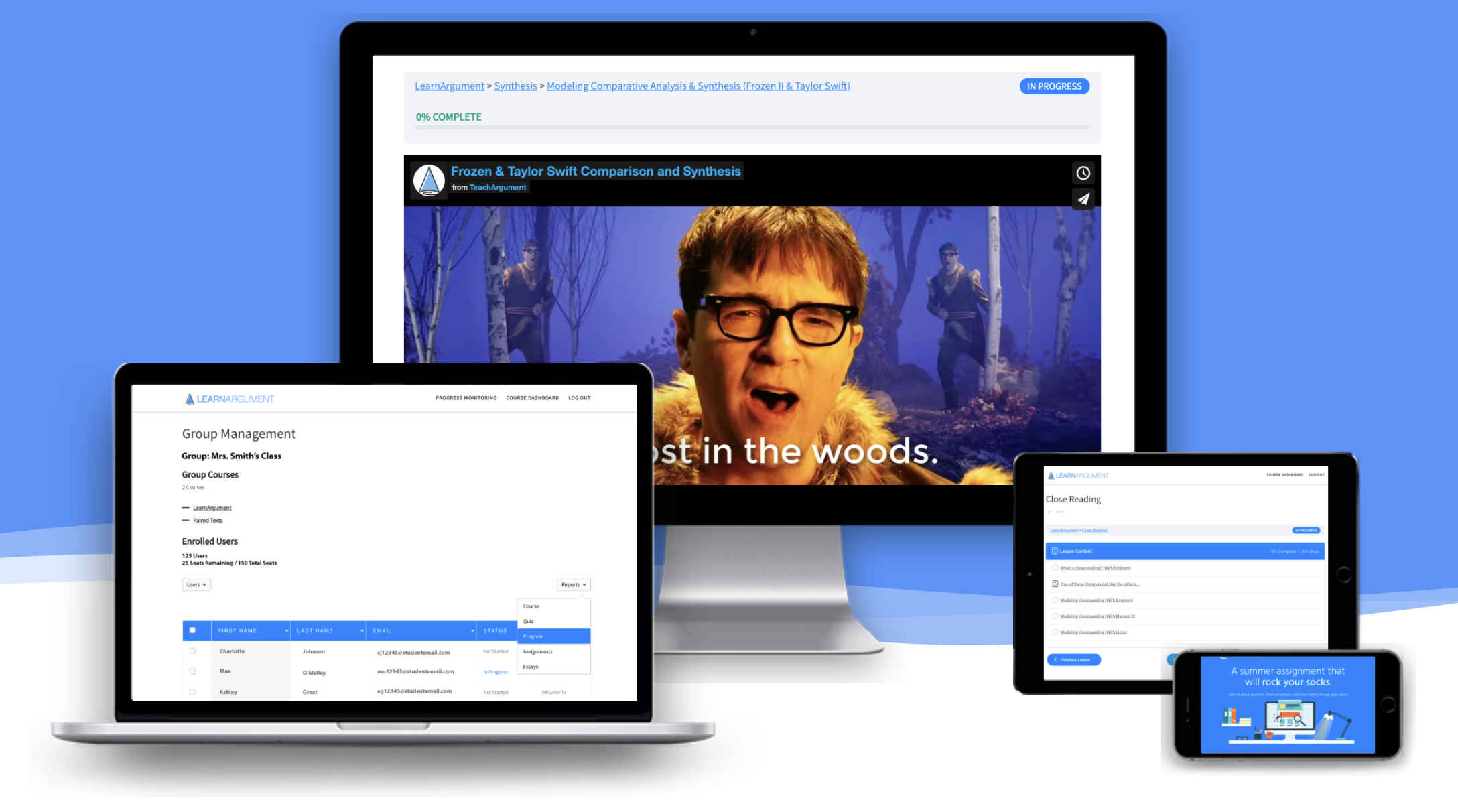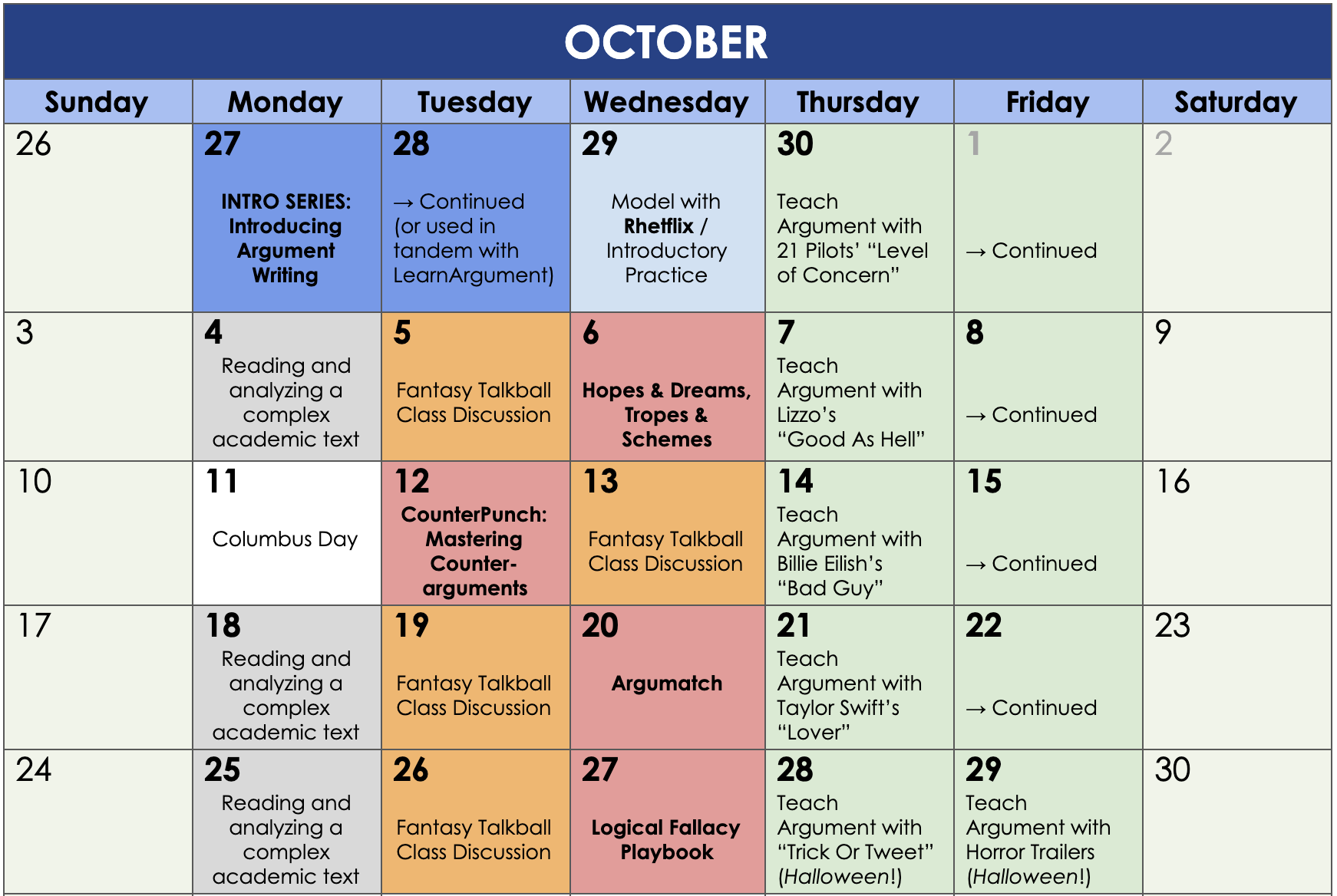TeachArgument offers a wealth of resources for, well, teaching argument, as well as a wide variety of other English-related lessons, games, and activities. If you’ve bumped into TeachArgument.com in the past, or if you’ve signed up to receive free resources in your inbox all year long, you have likely seen some of the super-engaging pop culture lessons we’re best known for.
But if you’re wondering how you might best utilize all of these resources that TeachArgument has to offer in the year ahead, look no further. We’ve developed this guide to help you organize your year and to put every TeachArgument resource to good use!
#1. Lay a Strong Foundation!
Laying a strong foundation for students is critical in any content area that requires the development of skills that build upon each other. Your students are undoubtedly entering your classroom fraught with misconceptions:
- Many don’t know what “close reading” means, or what it’s “supposed” to look like
- Many think an argument is just a conflict between two people
- Many haven’t used the word “synthesis” outside of a science class
By addressing misconceptions early, and by clearly introducing the concepts that are central to all of the meaningful work that will occur in your class, you’ll throw open the doors of possibility and set your students up for success — in your course, and beyond.
To support you in introducing these critical concepts in ways that are authentic, relevant, and engaging, TeachArgument has put the following tools in your toolkit:
 Introductory Series. Every member of TeachArgument has access to a specially designed “introductory series” of slide decks, PDFs, and video analyses that serve to introduce four key concepts:
Introductory Series. Every member of TeachArgument has access to a specially designed “introductory series” of slide decks, PDFs, and video analyses that serve to introduce four key concepts:
-
- Close Reading
- Rhetorical Analysis
- Synthesis
- Argument Writing
These resources serve to introduce complex concepts in accessible ways, drawing from popular culture to promote both rigor and joy in your classroom. What better way to introduce close reading and rhetorical analysis than with the complex rhetoric Disney movies have to offer us?
You can, of course, use these introductory series in whatever way best fits your curriculum. This could be crammed into a week (although we don’t recommend that), or interspersed over the course of the entire school year.
If you’re planning from scratch, we encourage you to try one of these per week for four consecutive weeks. This can provide students with enough time to digest each concept, to build on their developing understandings with each subsequent week, and to deepen those understandings each time the concepts are revisited thereafter.
 LearnArgument. In addition to resources that you can use to introduce the core concepts of close reading and argument to your students, TeachArgument offers an online learning platform that essentially automates the entire process for you. Think of LearnArgument is an online course that’s already built, and with just a few clicks, ready for you to deploy to your students. Your students will learn close reading with Lizzo, rhetorical analysis with Post Malone, and synthesis with Weezer and Taylor Swift, and as they do, you’ll be able to track their progress through the coursework.
LearnArgument. In addition to resources that you can use to introduce the core concepts of close reading and argument to your students, TeachArgument offers an online learning platform that essentially automates the entire process for you. Think of LearnArgument is an online course that’s already built, and with just a few clicks, ready for you to deploy to your students. Your students will learn close reading with Lizzo, rhetorical analysis with Post Malone, and synthesis with Weezer and Taylor Swift, and as they do, you’ll be able to track their progress through the coursework.
LearnArgument is most popularly utilized in two ways:
#1 – As a summer assignment that ensures students are starting the year with a rich understanding of (and love for) rhetorical analysis.
#2 – As a springboard into the concepts of close reading, rhetorical analysis, synthesis, and argument writing, as they are introduced throughout the course of the year. In this way, LearnArgument can be used in tandem with the “introductory series” to support and reinforce students’ understandings.
Model the Process!
Once the core concepts have been introduced, there is little more powerful than actually modeling exactly the kinds of analytical thought processes you’re expecting your students to engage in. This is the power of thinking aloud as you engage with an analysis and of engaging in full-class analyses of a particular text.
Of course, effective modeling is resource intensive. It’s draining, it’s time consuming, and it’s often limited to what occurs during class in realtime. Fortunately, TeachArgument has developed a number of resources that promise to make this significantly easier, more sustainable, and incredibly engaging:
- Rhetflix. Over the years, we have created a number of video analyses that unpack the arguments in popular songs, music videos, commercials, political speeches, and more. Many of these resources are posted to our YouTube channel (and free!), but occasionally, YouTube’s automated system flags and removes videos because they contain copyrighted content (e.g. snippets of the lyrics being analyzed).
The most reliable way to access this library of video analyses is on the TeachArgument website, on a portion of our blog that we’ve endearingly called “Rhetflix.” (Even when YouTube’s automated system takes our analyses down, they’ll remain accessible on “Rhetflix.”)
If you aren’t already receiving our free resources, you can sign up here to ensure that you never miss a new pop culture video analysis as soon as it’s posted!
- Exclusive Videos. In addition to the collection of video analyses that are accessible for free on our blog, TeachArgument members can access additional analyses by signing into TeachArgument.com. Where “Rhetflix” places an emphasis on current trends in pop culture, our members-only video archive features iconic songs such as Journey’s “Don’t Stop Believin,” The Beatles’ “Hey Jude,” Nirvana’s “Smells Like Teen Spirit,” and more.
Practice!
Once your students have a grasp of the concepts they’re being asked to engage with, the rest of the course can be boiled down to one word: practice. Of course, it’s far more complex than just repeating the same old analyses. Practice must be purposeful to ensure students’ skills are continuously getting sharper, their understandings deeper, their critical thinking processes more flexible and generalizable to novel contexts.
This is why we practice the same core skills (such as close reading and rhetorical analysis) across multiple genres (speeches, songs, essays, ads, and so on), and with frequency within genres (two political speeches from competing candidates, two pop singers writing about each other, and so on).
The nuances are always different, the arguments are always unique, and there is always more to learn.
But one of the greatest obstacles to consistent, meaningful practice is a lack of student engagement. There’s no shortage of essays, presidential speeches, and academic criticisms out there for students to read and unpack — but when students perceive the readings to be dry, boring, inauthentic, or irrelevant, attention wanes.
This is perhaps TeachArgument’s greatest strength, and the greatest value that TeachArgument can add to your arsenal of teaching tools — surely because we’re completely obsessed with student engagement.
Our pop culture lesson archive contains a huge library of lesson bundles that use popular culture to teach close reading, rhetorical analysis, and argument. These lessons target specific skills and rhetorical devices that are appropriate given the context of the text being analyzed. They’re designed to be engaging, relevant, and awesome, all in an effort to marry the rigor of rhetorical analysis with the joy of unpacking a really interesting popular text.
The pop culture lesson archive is full of lessons that pack a punch even years after they were created, given the cultural power of the target texts. (Teaching argument with Hamilton, Taylor Swift, and Super Bowl commercials are a few examples that come to mind.) And better still, the library is constantly expanding since compelling arguments continuously enter into the popular landscape.
There are three easy ways to get your hands on these lessons, so you can pick the “speed” that’s most appropriate for your needs:
- If you’re just looking to get a taste, you can sign up here to receive free excerpts of newly released lessons throughout the course of the year. These excerpts are generally PDFs that can be printed and put into practice without any prep beforehand.
- If you’re looking for something more extensive than a single activity, or if you’d like more control over what you teach, you can peruse and purchase many of our pop culture lesson bundles “a la carte.” Most bundles are about five bucks when purchased individually.
- If you’d like access to the entire pop culture lesson archive, you can become a member and instantly gain access to all of our resources. It goes without saying that you’ll have a whole lot more magic at your fingertips when you’re a member, and the value (i.e. cost savings) is tremendous. You can register right here!
Once you have access to a huge library of pop culture infused lessons, planning for the rest of the year becomes a whole lot more fun. While they can be implemented in versatile ways, we encourage you to reserve one day a week for pop culture glory.
Here’s an example of what your September might look like with all of these resources put to work:

Targeted Skills!
Once you’ve established a rhythm for developing the core skills, you’ll surely want to hone in on some of the areas that are highlighted in your curriculum, or that are notoriously challenging for students to master.
To that end, TeachArgument has developed a set of “Core Argument” lessons that include:
- CounterPunch for counterargument
- Logical Fallacy Playbook for logically fallacies
- Hopes & Dreams, Tropes & Schemes for rhetorical devices
And more, which can be perused and purchased “a la carte” (just like the pop culture lesson archive), or can be accessed by TeachArgument members.
But Wait. There’s More!
There’s more to it. TeachArgument has developed a variety of games and game-based activities that bolster engagement while teaching the skills we value most. Games like Argumatch, Lingo, and Fantasy Talkball can be powerful additions to your repertoire. (Games, too, can be purchased a la carte or accessed in full with membership.)
Likewise, TeachArgument has an arsenal of literature based argument lessons that bring close reading and rhetorical analysis skills to canonical literary texts in American and British Literature. These units, too, can supercharge your existing curriculum in incredible ways. (Literature units, like games, can be purchased a la carte or accessed in full with membership.)
Here’s what October (and subsequent months) might looks like when all systems are go:

Join Now!
If you aren’t a member yet, the time to join is now! Register here to get instant access to all of the resources described above, and make this the best year EVER.

